

9 Essential ESA Qualifications Every Owner Should Know
by Lena Park
Last updated: July 15, 2025
Verified and Approved by:
Angela Morris,
MSW, LCSW
Fact Checked

Overview
Understanding the qualifications for obtaining an Emotional Support Animal (ESA) letter is vital for every owner. It’s important to recognize the legal distinctions between ESAs and service animals, as well as the role of licensed medical professionals in the qualification process. Additionally, being aware of the responsibilities that come with being an ESA handler can make a significant difference.
This article offers a compassionate overview of the streamlined process for obtaining ESA letters, highlighting the necessity of professional evaluations and adherence to legal protections. These elements are crucial for safeguarding the rights of ESA owners under the Fair Housing Act and Air Carrier Access Act, ensuring that individuals receive the support they need during challenging times.
Introduction
The increasing recognition of emotional support animals (ESAs) underscores their vital role in enhancing mental well-being for many individuals. As more people seek the comfort and companionship these animals provide, it becomes essential to understand the qualifications needed to obtain an ESA letter. Yet, navigating the complexities of legal definitions, responsibilities, and the ever-changing landscape of ESA regulations can feel overwhelming.
Have you considered what key qualifications every potential ESA owner should know to ensure they receive the support they need on their journey toward emotional health?
Wellness Wag: Streamlined Process for Obtaining ESA Letters
At Wellness Wag, we understand the emotional challenges that many individuals face. The journey to mental well-being can often feel overwhelming, and that’s why we offer a streamlined, three-step process for obtaining ESA qualifications for an Emotional Support Animal (ESA) letter.
- It begins with a short online evaluation tailored to your specific emotional assistance needs, helping to determine your eligibility.
- Following this, you will have a compassionate consultation with licensed medical professionals who are dedicated to assessing your mental health requirements.
- Once approved, you can expect to receive your official ESA letter within 24 hours, providing you with prompt support when you need it most.
This efficient approach not only facilitates access to the necessary documentation but also ensures compliance with legal requirements, which is essential for advocating for your rights under the Fair Housing Act and Air Carrier Access Act.
The increasing demand for emotional support animals is evident, with a 20% yearly rise in therapy dog programs since 2019. This statistic underscores the importance of possessing valid ESA qualifications. With over 50,000 patients served, Wellness Wag is committed to a swift response and client-focused care, positioning us as your reliable partner in connecting your mental health needs with the therapeutic benefits of pet companionship.
If you’re considering obtaining an ESA letter, we invite you to take the first step towards enhancing your emotional well-being by visiting Wellness Wag’s website to complete the assessment. Remember, you are not alone on this journey; support is available, and we are here to help you every step of the way.
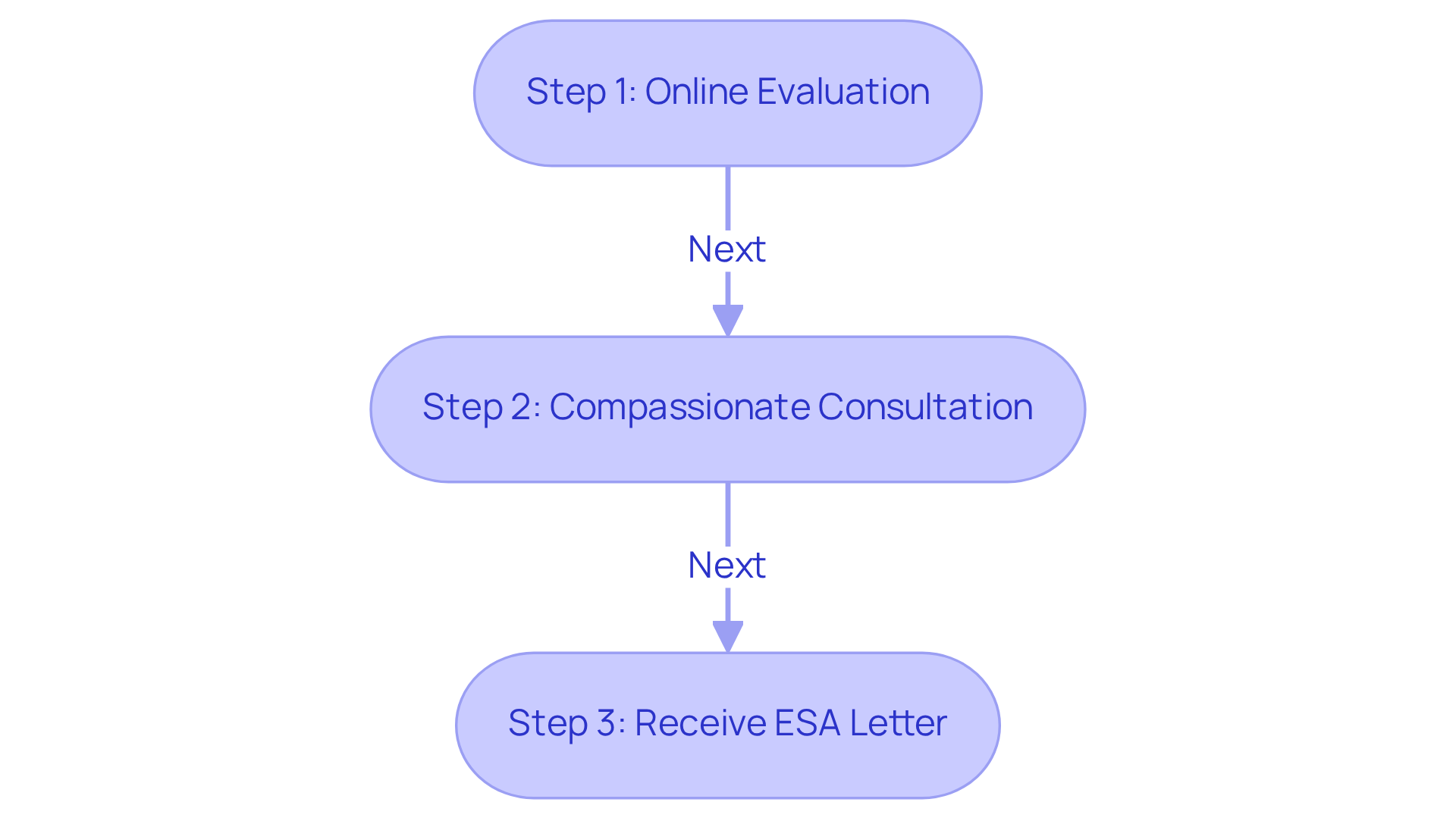
Legal Definition of Emotional Support Animals Under the ADA
Under the Americans with Disabilities Act (ADA), emotional support animals are recognized as companions that provide comfort and assistance to individuals dealing with mental health conditions. Unlike service animals, which are specifically trained to perform tasks related to a person’s disability, emotional support animals do not require specialized training. Understanding this distinction is crucial for grasping the legal protections and limitations surrounding emotional support animals.
Many individuals face emotional challenges that can feel overwhelming. Recent statistics reveal that approximately 18% of pet owners in the U.S. have emotional support companions, underscoring their importance in addressing mental health needs. While these animals can offer significant emotional benefits, it’s essential to recognize that they do not hold the same legal status as service animals under the ADA. For instance, service animals are permitted in all public spaces, whereas emotional support animals may encounter restrictions in certain environments.
The legal landscape for emotional support animals has evolved, particularly with the Fair Housing Act (FHA), which mandates reasonable accommodations for individuals with disabilities regarding housing. This means that landlords cannot enforce ‘no pet’ policies against tenants who have valid ESA qualifications. However, the ADA does not classify emotional support animals as service animals, limiting their access rights in public spaces and transportation.
Disability rights advocates stress the importance of comprehending these distinctions, as they can significantly affect individuals seeking the therapeutic companionship of their pets. Have you ever felt the comfort of a beloved pet during tough times? As the legal landscape continues to change, staying informed about ESA qualifications is vital for pet owners navigating housing and travel challenges. Remember, support is available, and understanding your rights can help you make the most of your emotional support companion.
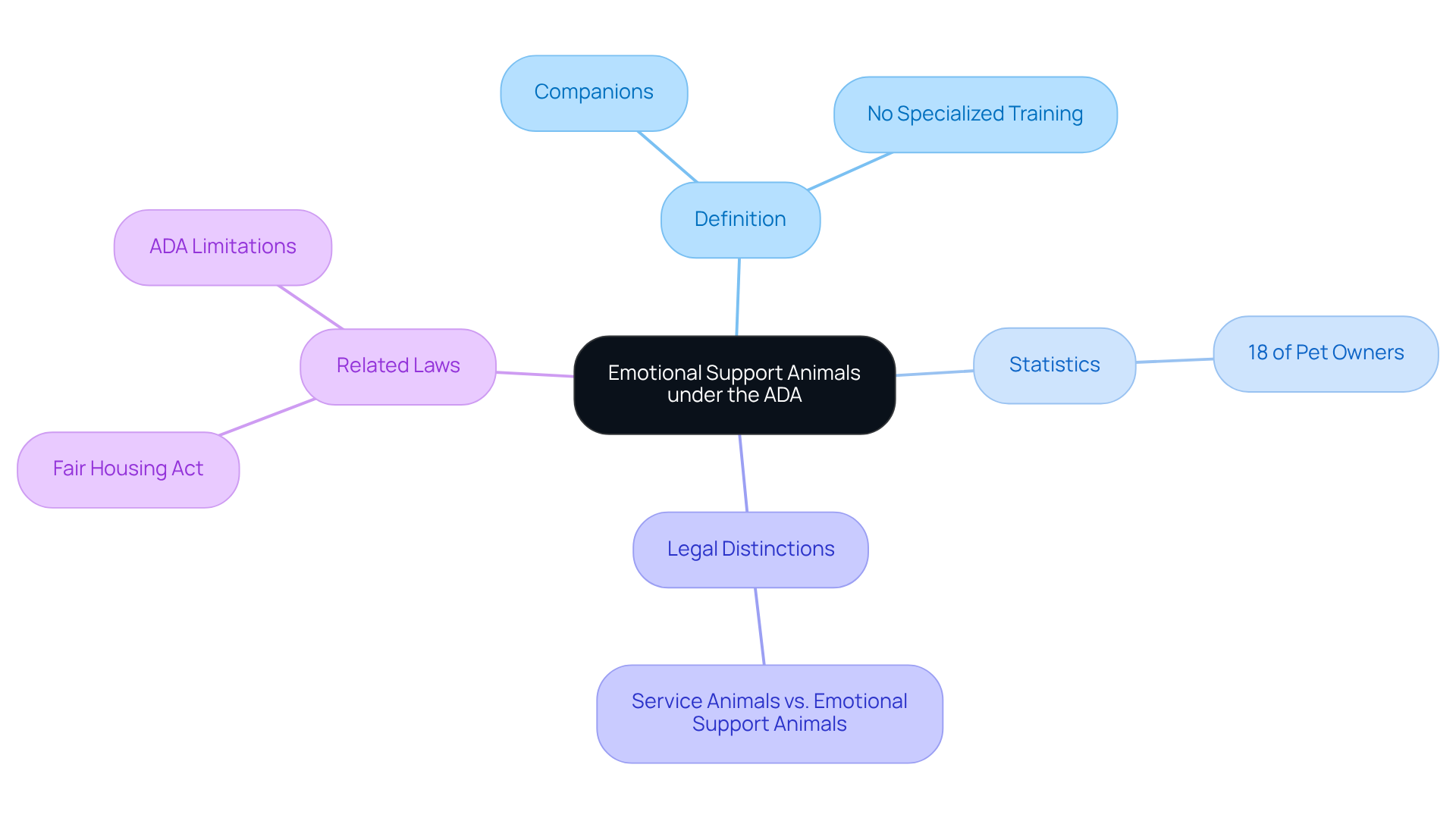
Recognized Mental Health Conditions for ESA Qualification
Many individuals face emotional challenges such as anxiety disorders, depression, post-traumatic stress disorder (PTSD), and bipolar disorder. These struggles can be overwhelming, making it essential to seek support. An Emotional Support Animal (ESA) can play a crucial role in enhancing emotional well-being, as confirmed by a licensed mental health professional who assesses the necessity of ESA qualifications.
At Wellness Wag, we understand the importance of this support and offer a streamlined online process to help individuals obtain ESA letters, tailored to various states. Many satisfied customers have shared their heartfelt testimonials, illustrating how this service has positively transformed their lives. Have you ever considered how an ESA could provide comfort during tough times?
If you are pursuing ESA qualifications, it is vital to consult with a qualified mental health expert. They can help assess your needs and ensure that your animal can provide the necessary assistance to alleviate the symptoms linked to these conditions. Remember, you are not alone on this journey—support is available, and we are here to help you every step of the way.
Role of Licensed Medical Professionals in ESA Letter Issuance
Licensed medical professionals, including psychiatrists and psychologists, play a crucial role in providing ESA qualifications for Emotional Support Animal letters. These evaluations not only assess a person’s mental health status but also establish the vital need for ESA qualifications to provide emotional support. This professional scrutiny is essential, as it validates the ESA qualifications and ensures compliance with legal standards, thereby protecting the rights of ESA owners and promoting equal access to housing for students with disabilities.
Many individuals face emotional challenges that can feel overwhelming, and studies reveal that over 30% of psychiatric facilities now include animal-assisted therapy. This statistic highlights the growing recognition of the therapeutic benefits that emotional support animals can provide in mental health care. Mental health evaluations typically encompass comprehensive assessments, including interviews and standardized questionnaires, aimed at understanding the individual’s emotional or psychological needs. How might having an ESA change your life?
Experts consistently emphasize the importance of these evaluations, as they offer a structured method to comprehend the relationship between the individual and their ESA qualifications, ultimately enhancing the credibility of the assistance provided. Furthermore, valid ESA qualifications must include specific components, such as:
- The mental health professional’s details
- A clear statement of the individual’s disability
- A reminder that ESA qualifications need to be renewed annually
This reinforces the necessity of professional involvement in this process while ensuring compliance with HIPAA regulations to protect client health information.
In navigating the complexities of mental health, remember that support is available. ESA letters serve as a compassionate solution, providing not just validation but also a sense of hope and connection for those who need it most.
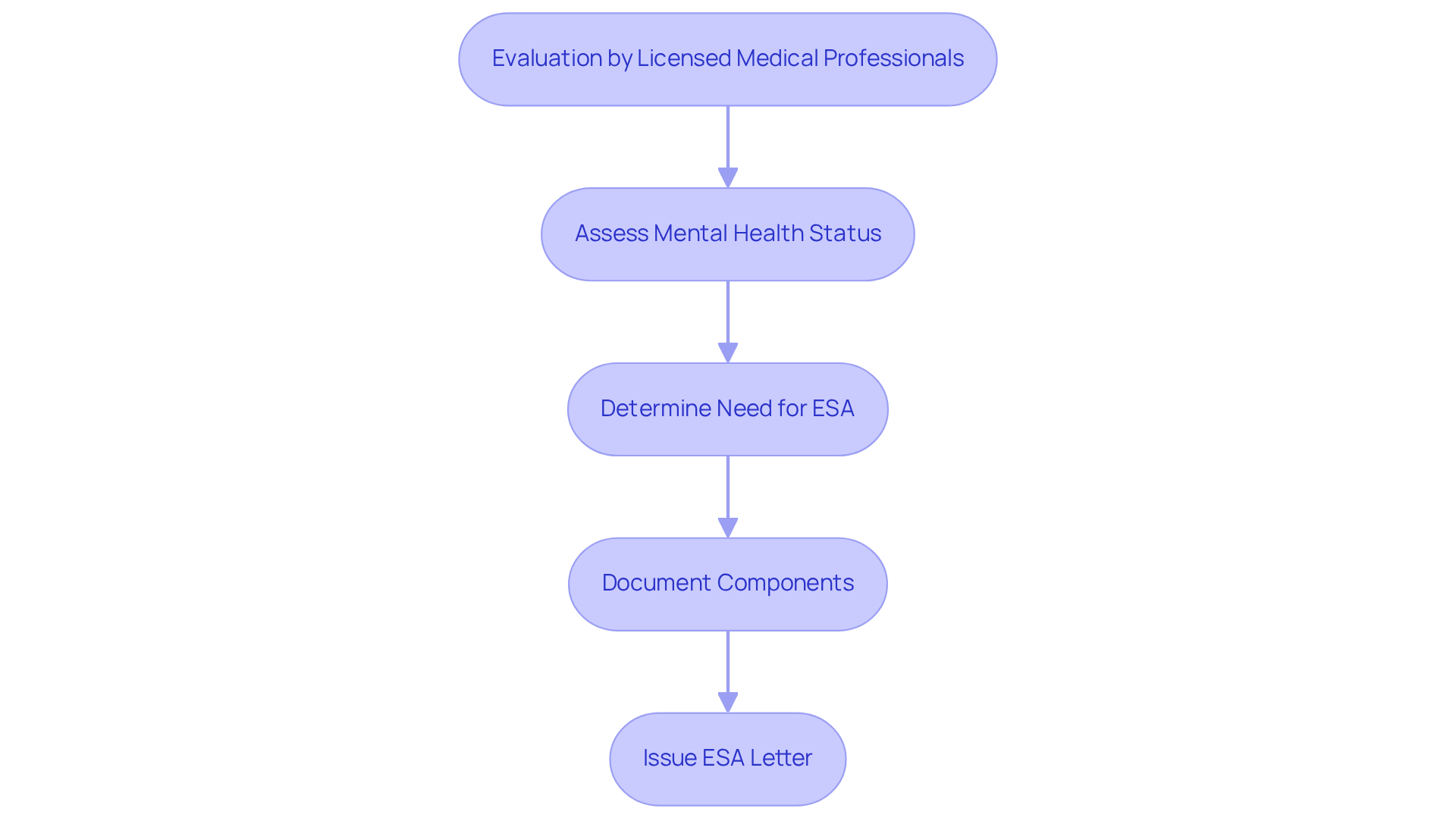
Handler Responsibilities for Emotional Support Animals
Handlers of emotional assistance creatures bear significant responsibilities for the care, supervision, and overall well-being of their companions. This duty encompasses ensuring that emotional support animals receive proper training, regular veterinary check-ups, and appropriate socialization to thrive in public settings. It’s heartening to note that many ESA owners prioritize this training and care, recognizing its vital role in supporting their mental health journey.
Best practices for caring for an ESA involve establishing a routine that includes:
- Daily exercise
- Mental stimulation
- Social interaction
Veterinarians emphasize that regular training not only enhances the animal’s behavior but also strengthens the bond between the ESA and the owner, which is crucial for emotional support. Additionally, owners should remain vigilant about their emotional support animals’ health, ensuring they receive vaccinations and preventive care to avert any health issues that could hinder their ability to provide assistance.
Owning an ESA comes with specific responsibilities, including understanding the legal rights associated with ESA qualifications under the Fair Housing Act and the Air Carrier Access Act. It is essential for owners to advocate for these rights while ensuring their pets are well-mannered and do not disrupt public areas. By embracing these duties, ESA handlers can ensure their companions effectively contribute to their emotional stability and overall mental health.
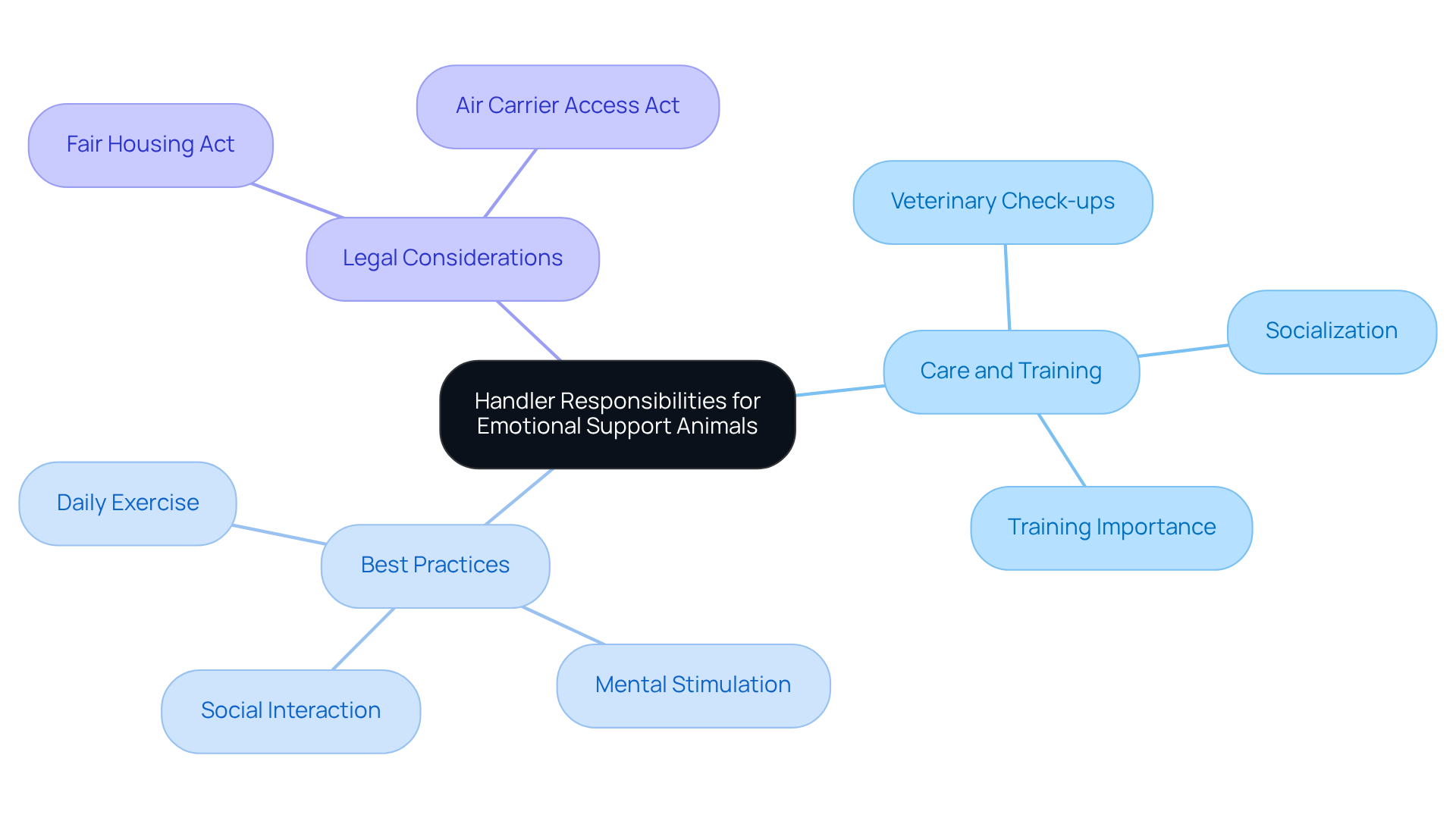
Housing Rights Under the Fair Housing Act for ESA Owners
Under the Fair Housing Act (FHA), individuals with ESA qualifications are granted the right to live alongside their Emotional Support Animals (ESAs) in housing that typically prohibits pets. This compassionate legislation ensures that landlords cannot impose extra fees or deposits for emotional support animals, although they may request ESA qualifications to verify the animal’s status.
In 2023, a significant 52.61% of fair housing complaints were related to disability discrimination, underscoring the necessity of these protections. Recent updates reveal that landlords must respond to requests regarding ESA qualifications within 10 days; delays beyond this timeframe may indicate a violation of HUD guidelines, fostering a more accommodating environment for tenants in need.
Many have reported successful emotional support animal accommodations across various housing scenarios, demonstrating the profound positive impact such animals can have on mental health. Notably, around 200,000 registered emotional support animals are present in the United States, with 88% of their owners acknowledging a beneficial influence on their mental well-being.
Advocates stress that these protections are essential for individuals with disabilities, ensuring they can access housing in line with ESA qualifications without facing discrimination. As Zoe Harper wisely noted, “Tenants with emotional assistance animals are safeguarded under the Fair Housing Act, allowing them to reside with their support animals in their homes, regardless of pet regulations.” This reinforces the message that support is available, and individuals facing these challenges are not alone.
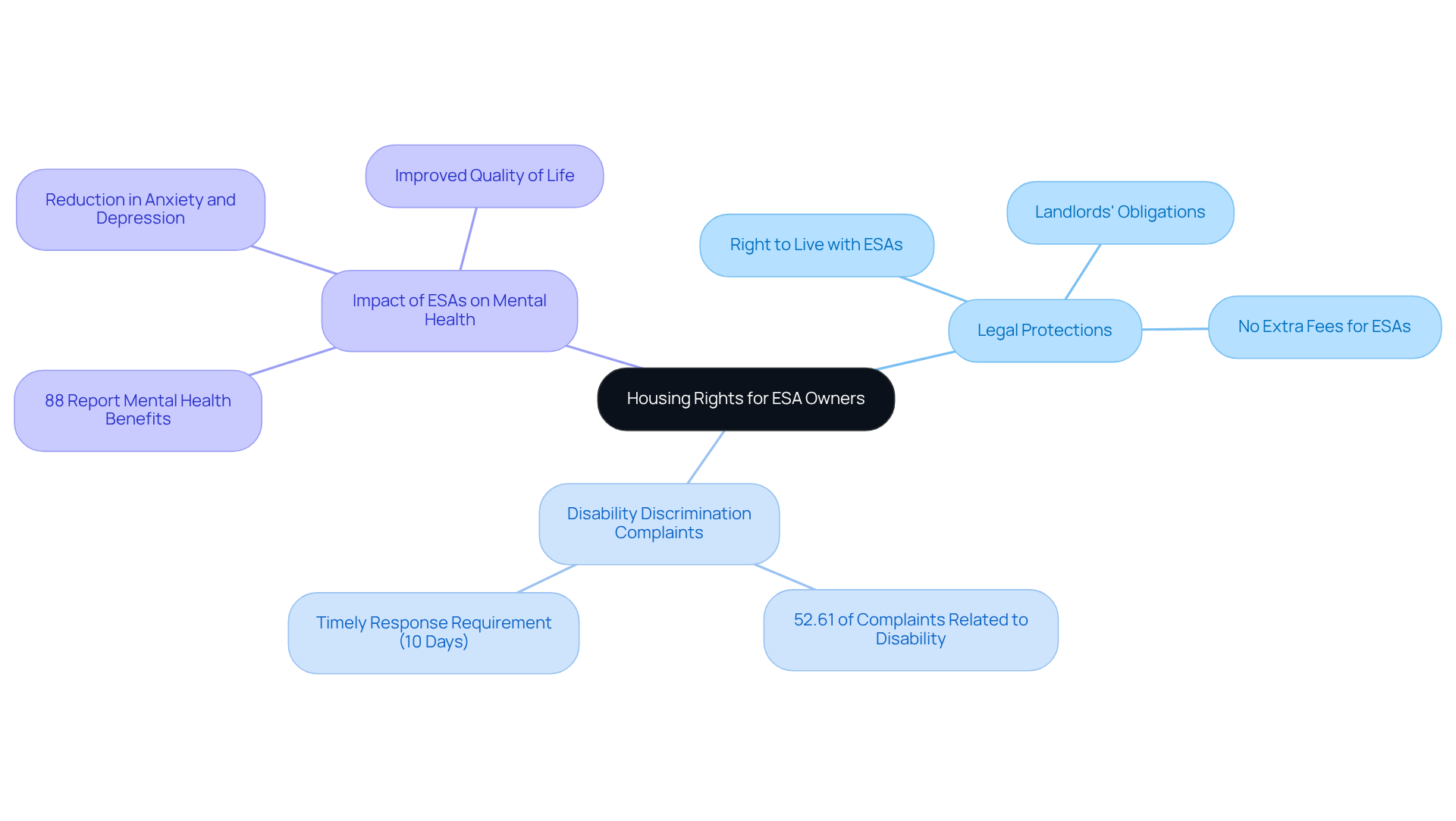
Travel Regulations for Emotional Support Animals
The recent significant changes in travel rules have affected emotional support animals (ESA qualifications), leaving many ESA owners feeling uncertain and anxious. With numerous airlines now classifying these beloved companions as typical pets rather than service animals, owners may encounter standard pet policies that can include additional fees, specific carrier requirements, and travel restrictions. By 2025, only a small fraction of airlines will still recognize ESA qualifications as valid for service companions, illustrating a broader trend towards stricter regulations that can be disheartening for many.
It’s crucial to understand that emotional support animals have different ESA qualifications compared to service dogs, which are trained to perform specific tasks and possess legal rights under the ADA. The recent decisions from the U.S. Department of Transportation have made it clear that emotional support animals will no longer be allowed in the cabin without fees, prompting owners to prepare for potential adjustments in their travel plans. This can be overwhelming, but recognizing these differences and the related policies is vital for ESA owners to navigate these challenges with greater ease while understanding the ESA qualifications.
Feeling the weight of these changes can be tough, but you’re not alone. Many ESA owners are facing similar hurdles, and it’s important to remember that there are supportive resources available to help you. Checking with your specific airline for the latest regulations and requirements can ensure a smoother travel experience for both you and your emotional companion. By staying informed and prepared, you can alleviate some of the stress associated with these new policies, allowing for a more enjoyable journey ahead.
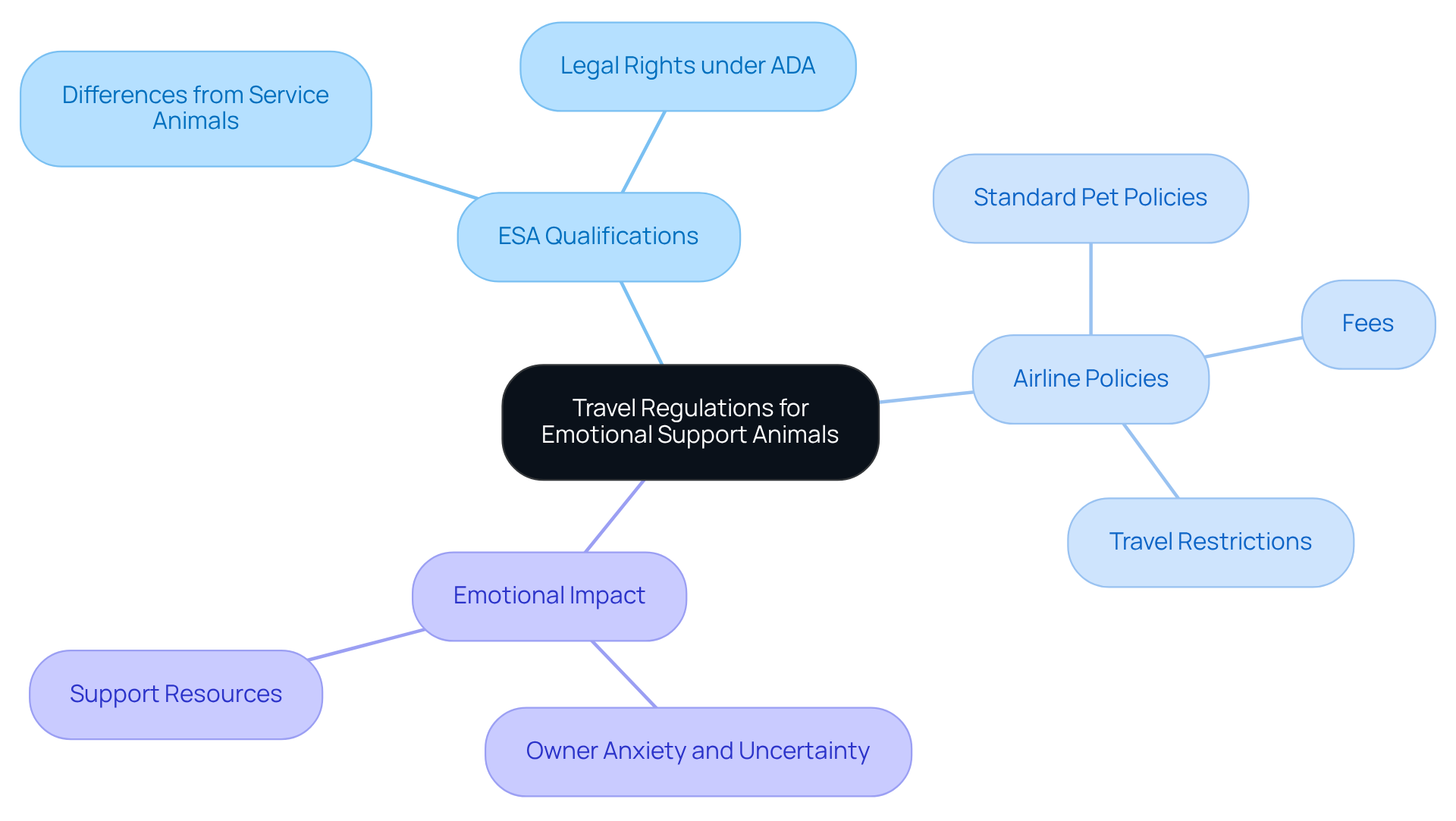
Distinction Between Service Animals and Emotional Support Animals
Understanding the difference between service creatures and emotional support beings is vital for recognizing their unique roles, including the esa qualifications and legal protections. Service creatures, specially trained to assist individuals with disabilities, enjoy broader access rights under the Americans with Disabilities Act (ADA). They perform essential tasks such as guiding individuals who are blind, alerting those with hearing impairments, and providing support for mobility challenges. In 2022, Assistance Dogs International placed 4,469 new assistance dogs worldwide, reflecting the growing need for these remarkable companions.
On the other hand, emotional support animals offer comfort and companionship but do not meet the esa qualifications needed to perform specific tasks related to a disability. As a result, emotional support creatures do not carry the same legal standing as service beings, which restricts their access primarily to housing and certain air travel situations. A survey indicated that about 46.9% of the public believes that having a pet can improve mental health, yet many remain unaware of the crucial legal differences between these two types of creatures.
Legal experts emphasize that while service beings are recognized under the ADA, emotional support creatures do not meet esa qualifications, which can lead to potential legal challenges for their owners. Misunderstandings about the rights of emotional support animals can create conflicts, especially in housing situations where landlords may not recognize the validity of emotional support animal documentation. Understanding these distinctions is essential for individuals navigating the complexities of emotional assistance and service creature regulations.
To effectively advocate for their rights, ESA owners should familiarize themselves with the Fair Housing Act and the Air Carrier Access Act, which clarify their esa qualifications and legal protections. Furthermore, being equipped with the appropriate documentation can help reduce possible disputes with landlords or travel authorities. By taking these steps, ESA owners can feel more secure and supported in their journey.
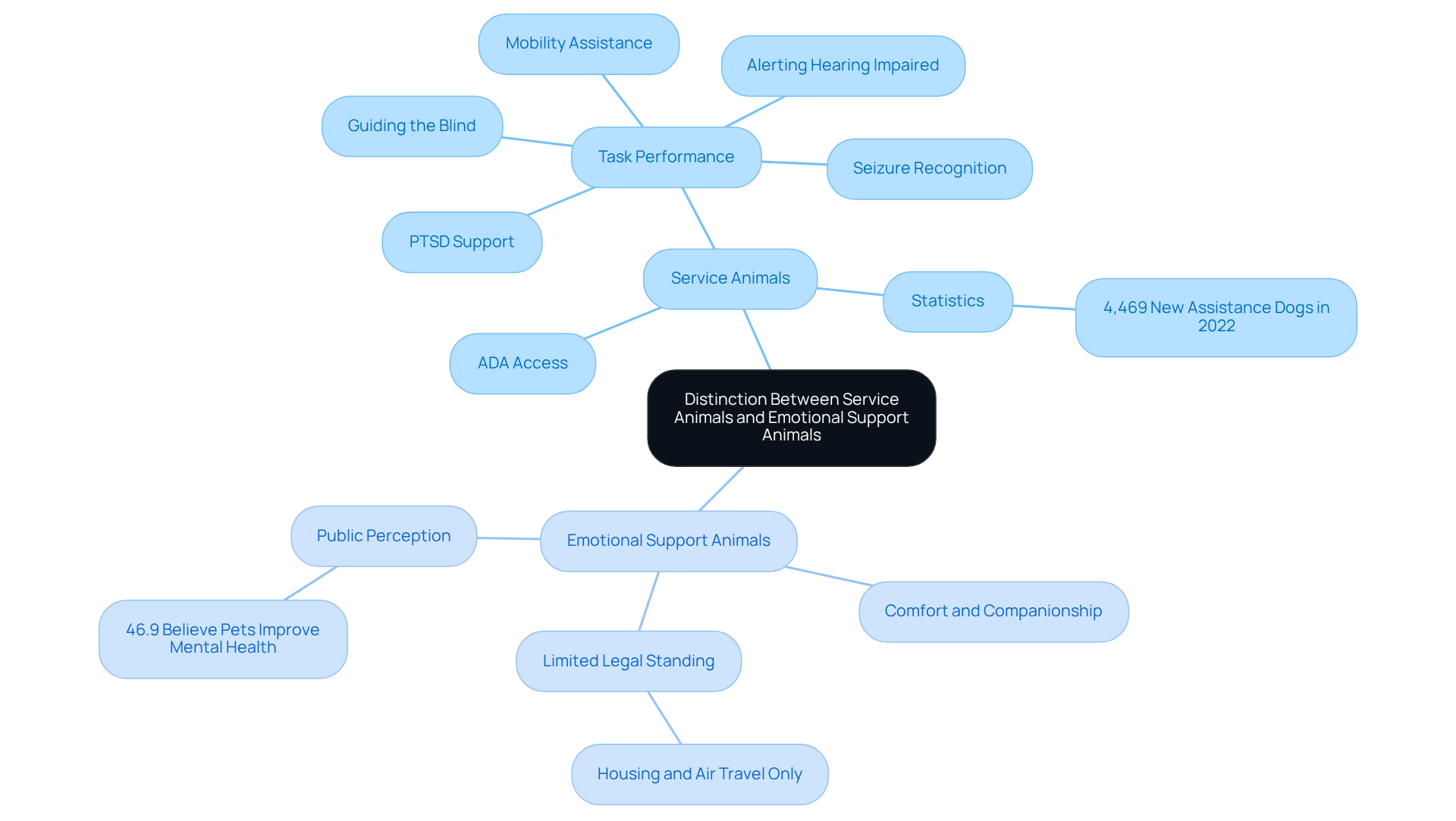
Emotional Benefits of Having an Emotional Support Animal
Emotional support animals (ESAs) provide significant emotional benefits, such as reduced anxiety, heightened feelings of security, and enhanced overall wellness. For many, the companionship of an ESA can alleviate loneliness and depression, making them essential allies for individuals facing mental health challenges.
Have you ever felt isolated during tough times? Statistics reveal that:
- 62% of ESA owners reported improved mental health during the pandemic, in stark contrast to only 19% of those without an ESA who experienced similar benefits.
- 96.80% of participants in a recent study noted reduced stress and better sleep patterns thanks to their ESA dogs.
Psychologists highlight that the bond between humans and animals fosters emotional stability, with many individuals crediting their pets for helping them cope during difficult moments. The presence of an ESA not only provides comfort but also enhances feelings of security and independence, as shown by:
- 99.29% of participants reporting increased safety.
- 84% of emotional support animal owners experience significant improvements in their mental well-being.
This underscores the profound positive impact these animals have on mental health, making them invaluable companions for those in need.
Clients of Wellness Wag have echoed these sentiments, sharing testimonials that reflect how the streamlined process for obtaining ESA qualifications has positively transformed their lives. For instance, James B. expressed, ‘The approval process for my ESA was easy and hassle-free,’ while Linda S. remarked, ‘Wellness Wag made getting an Emotional Support Animal a breeze.’
These experiences illustrate Wellness Wag’s commitment to providing compassionate and efficient services, ensuring individuals can access the emotional support they need without added stress. Moreover, Wellness Wag offers expert consultations and legal insights to assist clients in navigating the complexities of ESA qualifications, thereby enhancing their overall experience and reinforcing the support available to them.
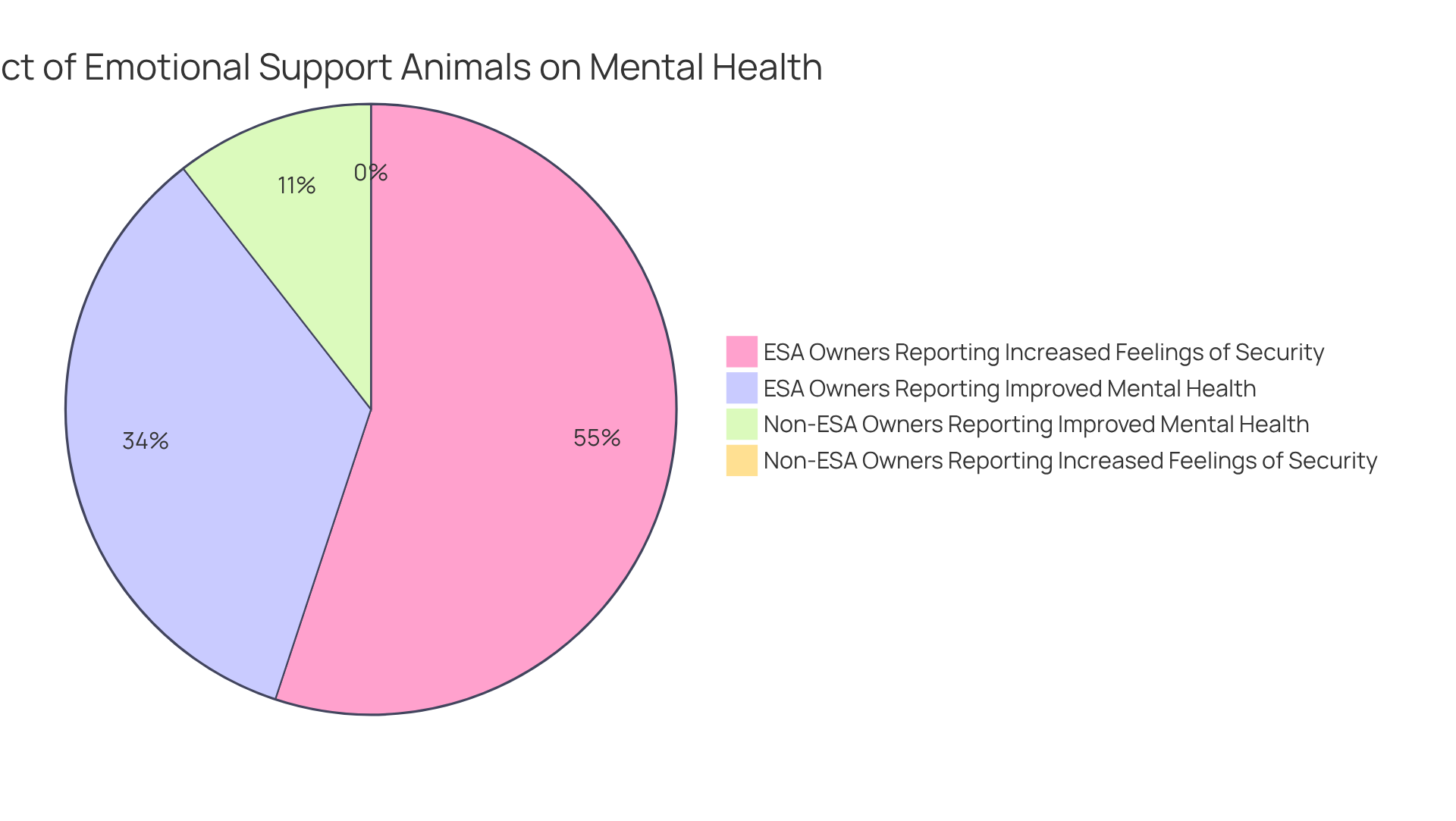
Alternative Support Options: Therapy Animals and Their Roles
Therapy creatures play a vital role in supporting mental well-being, distinct from emotional assistance animals. These trained companions offer comfort and affection in therapeutic settings, such as hospitals and schools, where they interact with many individuals. Unlike the ESA qualifications, which focus primarily on providing emotional support to one person, therapy creatures are part of structured programs designed to enhance mental health outcomes for diverse groups.
The prevalence of therapy pet programs is significant, with over 57% of hospices in the U.S. integrating pet therapy into their care strategies. Additionally, over 60% of U.S. colleges have adopted pet therapy programs, recognizing the positive impact these creatures can have on student well-being. Research indicates that interactions with therapy creatures can significantly reduce stress and anxiety levels, with 69% of pet owners reporting that their pets help alleviate these feelings.
Professionals in therapy utilizing assistance from living beings emphasize the differences between emotional support companions and therapy creatures. While ESA qualifications provide personalized emotional support, therapy animals are trained to assist in therapeutic environments, often working alongside licensed professionals to foster healing and comfort. This distinction is crucial for individuals seeking the appropriate type of support for their mental health needs.
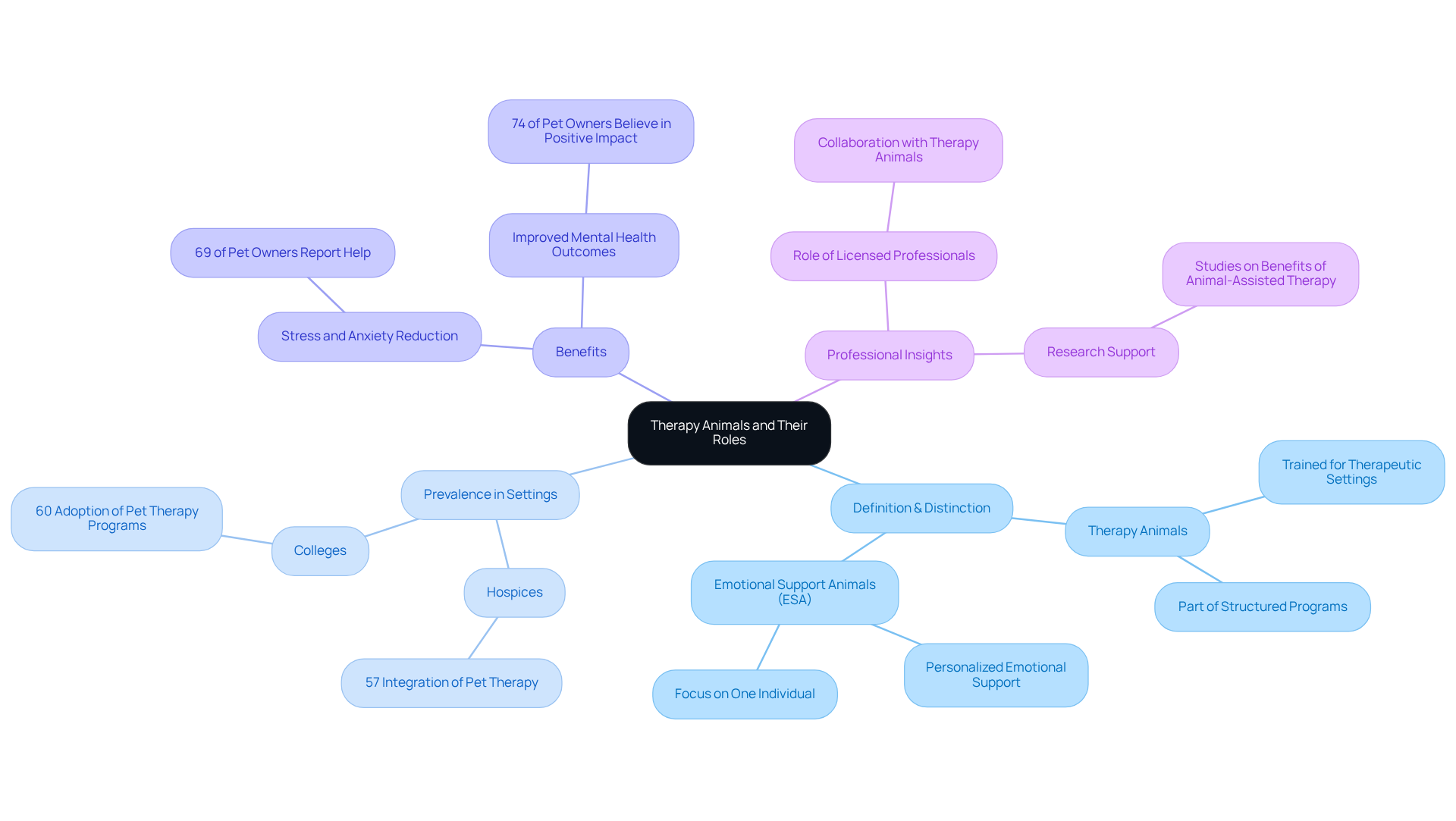
Conclusion
Understanding the essential qualifications for Emotional Support Animals (ESAs) is crucial for individuals seeking to enhance their mental well-being. Many face emotional challenges that can feel overwhelming and isolating. This article has explored the streamlined process for obtaining an ESA letter, the legal distinctions between ESAs and service animals, and the specific mental health conditions that qualify for ESA support. By grasping these key points, individuals can better navigate the complexities of ESA ownership and the associated rights under laws like the Fair Housing Act.
Throughout the discussion, we have highlighted the importance of licensed medical professionals in the ESA letter issuance process. It’s vital for ESA handlers to understand their responsibilities to ensure their companions thrive. Additionally, we addressed the evolving travel regulations affecting ESAs, emphasizing the need for owners to stay informed about the latest policies. The emotional benefits of having an ESA, including improved mental health and companionship during challenging times, further reinforce the significant role these animals play in supporting individuals.
As the landscape of emotional support continues to evolve, it is essential for potential ESA owners to remain informed and proactive. By understanding their rights and responsibilities, individuals can advocate for themselves and their emotional support companions effectively. Have you considered the process for obtaining an ESA letter? Recognizing the emotional benefits these animals provide is a crucial step in the journey towards mental wellness. Embrace this journey with the help of an ESA, knowing that support is available every step of the way.
Frequently Asked Questions
What is the process for obtaining an ESA letter through Wellness Wag?
The process involves a streamlined three-step approach: first, a short online evaluation to determine eligibility; second, a compassionate consultation with licensed medical professionals to assess mental health needs; and third, receiving the official ESA letter within 24 hours if approved.
What are emotional support animals (ESAs) recognized under the ADA?
Under the ADA, emotional support animals are recognized as companions that provide comfort and assistance to individuals with mental health conditions. Unlike service animals, ESAs do not require specialized training and have different legal protections and limitations.
How do ESAs differ from service animals in terms of legal status?
Service animals are trained to perform specific tasks related to a person’s disability and have access rights in all public spaces. In contrast, emotional support animals do not have the same legal status and may face restrictions in certain environments.
What legal protections do emotional support animals have?
Emotional support animals are protected under the Fair Housing Act (FHA), which requires reasonable accommodations for individuals with disabilities regarding housing, meaning landlords cannot enforce ‘no pet’ policies against tenants with valid ESA qualifications. However, they do not have the same access rights as service animals under the ADA.
What mental health conditions qualify for obtaining an ESA?
Recognized mental health conditions that may qualify for an ESA include anxiety disorders, depression, post-traumatic stress disorder (PTSD), and bipolar disorder. Consulting with a qualified mental health expert is essential to assess the necessity of an ESA.
How can Wellness Wag assist individuals seeking ESA qualifications?
Wellness Wag offers a streamlined online process to help individuals obtain ESA letters tailored to various states, along with support and guidance from licensed mental health professionals to ensure the animal can provide the necessary assistance.
Are there any statistics regarding the prevalence of emotional support animals?
Recent statistics indicate that approximately 18% of pet owners in the U.S. have emotional support companions, highlighting their importance in addressing mental health needs. Additionally, there has been a 20% yearly rise in therapy dog programs since 2019.
Certify Your Emotional Support Animal Today

Why You Can Rely on Us?
At Wellness Wag, we believe your pet deserves care rooted in both science and compassion. Each article is carefully researched, written in clear language for pet owners, and then reviewed by qualified professionals to ensure the information is evidence-based, current, and practical for real-life care. Our goal is to help you feel confident in making informed decisions about your pet’s health and well-being.
Reviewed by
Angela Morris, MSW, LCSW
Angela is a licensed clinical social worker with 20 years of experience in patient advocacy and community mental health. She has assisted numerous clients with ESA evaluations and brings a deep understanding of disability accommodations, ensuring that all information is accurate, supportive, and practical.

Written by :
Lena Park
Last Updated :
July 15, 2025












